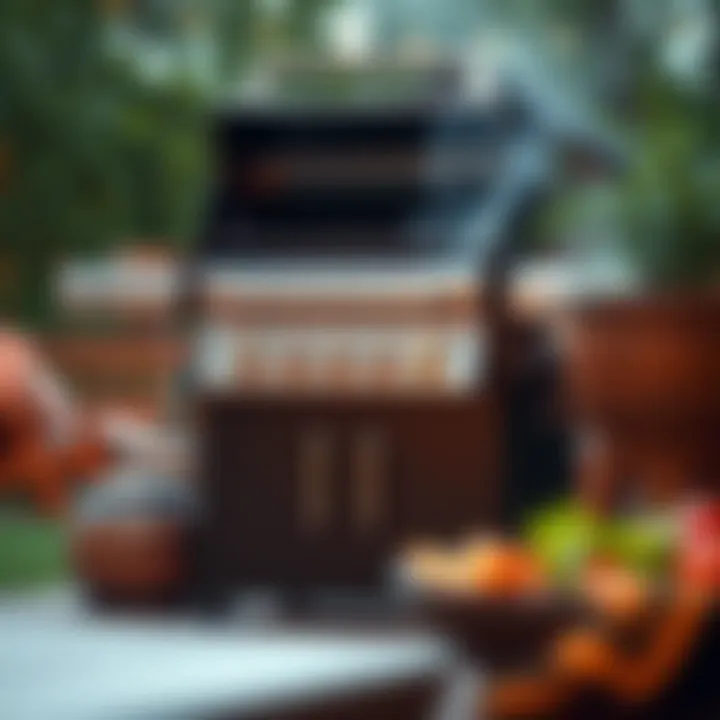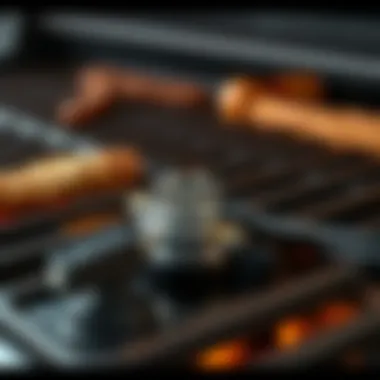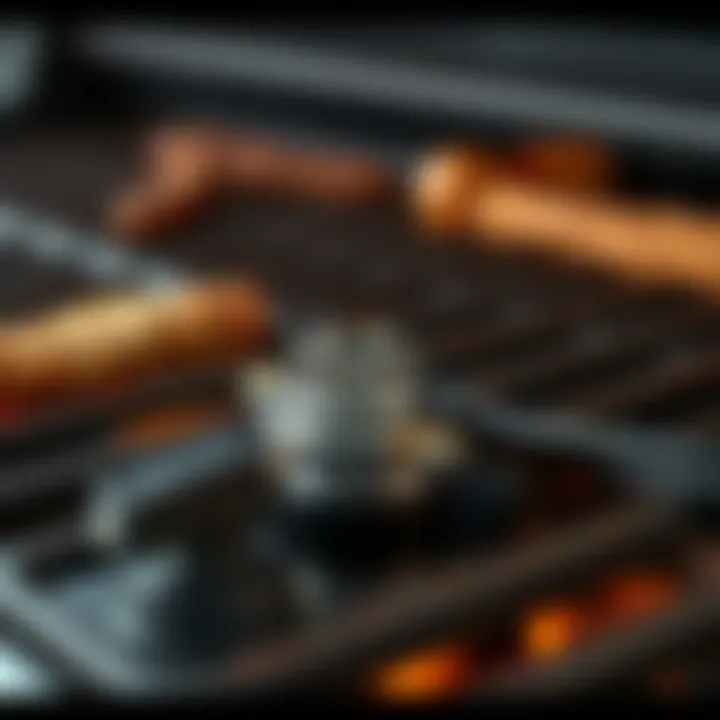In-Depth Guide to Propane BBQ Grills


Intro
Grilling is more than just a cooking method; it's a cultural experience, a way to gather friends and family, and for many, it’s a passion. Enter the propane BBQ grill, a staple of many backyards and an essential tool for any grill enthusiast. With the sizzle of meat and the aroma of spices in the air, propane grills provide the convenience of quick heat and consistent performance.
This article presents a thorough examination of propane BBQ grills. We will be discussing the nitty-gritty of various models available, what features to keep an eye out for, and even some dos and don'ts of maintenance and safety. The focus is on creating a handy resource tailored to everyone, whether you're just starting out or you’ve been flipping burgers for decades.
You might wonder why propane, out of all options available? Well, it's versatile and heats up rather quickly compared to charcoal, not to mention the ease of use. It's a favored choice for those who prefer to get right down to cooking, without the long wait often associated with other fuels. But rest assured, we'll weigh the pros and cons, and guide you through everything that you should consider before making a purchase.
From essential features such as burner types to user experiences and expert opinions, we aim to equip you with a treasure trove of knowledge. Let's dive deeper into the world of propane BBQ grills, ensuring you are fully prepared for your next grilling adventure.
Preface to Propane BBQ Grills
The aroma of grilled meat dancing in the air can draw anyone into the backyard, igniting memories of family gatherings, summer celebrations, and lazy Sunday afternoons. Propane BBQ grills have positioned themselves firmly at the center of outdoor cooking culture, bringing convenience and efficiency to the grilling experience. In this article, we will delve deep into the world of propane BBQ grills, shedding light on their features, benefits, and unique considerations.
This section will lay the foundation for understanding why propane grills are often the go-to choice for many grill enthusiasts. Their ease of use, efficiency, and ability to control heat levels offer considerable advantages, especially for those new to the game. With the push of a button and a flick of a knob, users can ignite their grill, enabling them to quickly set up for a barbecue without the fuss of traditional charcoal.
Understanding Propane as a Fuel Source
Propane, a byproduct of both petroleum refining and natural gas processing, serves as a clean-burning fuel that powers many backyard grills. Unlike its charcoal counterparts, which can produce a significant amount of smoke and soot, propane burns cleanly. This aspect not only contributes to a healthier cooking environment but also reduces the amount of cleaning required after grilling.
Moreover, propane’s portability is another feather in its cap. Tanks are easily transportable, allowing users the flexibility to grill in various locations—be it in the backyard, at a campsite, or at a tailgate event. Understanding propane means recognizing that this fuel source can be both efficient and practical, making it ideal for busy lifestyles. It heats up quickly and allows for precise temperature adjustments, letting grillers achieve that perfect sear on steak or a slow roast for ribs with minimal fuss.
The Evolution of BBQ Grilling
Historically, BBQ grilling has its roots entrenched in the traditions of various cultures. From the smoky pits of the American South to the sophisticated tandoor ovens of India, the basic principle has always revolved around cooking meat over an open flame. Yet, the invention and popularization of modern grilling technology, particularly propane BBQ grills, have transformed how grilling is perceived.
The evolution began in the mid-20th century as backyard grilling gained steam. The introduction of propane grills simplified the grilling process immensely. No more did one have to struggle with lighting charcoal and waiting for it to turn hot; instead, with propane, it was a matter of turning a knob.
Consider the shift in consumer preferences over the years. There’s a growing demand for versatility in grilling, resulting in features such as side burners and integrated smoking boxes becoming common. Features that turn an ordinary grill into a multifunctional cooking appliance indicate not just progress in appliance technology but also reflect how societal eating habits have changed. Consumers today seek flexibility in their outdoor cooking experiences, seeking ways to grill, roast, and even bake using the same unit.
In essence, understanding the history and evolution of BBQ grilling is crucial for making informed decisions as you navigate the realm of propane grills. The movement towards convenience, flavor, and functionality continues to push the industry forward, catering to both novice grillers and culinary artists aiming for that perfect barbecue meal.
Propane grills not only offer quick-start features but also embody an evolution of grilling techniques that balance tradition with modern living.
In the upcoming sections, we will dissect the various types of propane BBQ grills available and the key features that one should consider when investing in a grill, ensuring that outdoor cooking is as enjoyable as it is delicious.
Types of Propane BBQ Grills
Understanding the types of propane BBQ grills available on the market is crucial for making an informed decision that suits your grilling needs. Each type brings its own set of benefits and considerations, making it imperative to evaluate your preferences and requirements. Whether you’re looking for convenience, capacity, or customizability, knowing what options exist will give you a clearer picture of what’s best for you.
Portable Grills
Portable grills are the embodiment of convenience, perfect for those who thrive on spontaneity. These are generally lighter, compact, and easy to transport, making them ideal for camping trips, tailgating parties, or even just a picnic at the park. You can effortlessly toss them in your car trunk without a second thought.
However, usability often comes with limitations. They may have smaller cooking areas and fewer features compared to larger models, yet they still pack a punch in performance. For instance, the Coleman RoadTrip 285 is a favorite among outdoor enthusiasts for its collapsible design and multiple temperature zones, ensuring that whether you’re grilling chicken or sautéing vegetables, you won’t miss a beat.
Freestanding Grills
If you’re looking for a middle ground between portability and performance, freestanding grills might pique your interest. These often come with a sturdy base and provide ample cooking space, allowing for multiple dishes at once. They can be equipped with a variety of features like side burners, rotisserie kits, and even built-in lights.
The Weber Genesis II E-310, for example, embodies durability and functionality with its streamlined design and impressive heat distribution. While they require a designated space in your backyard, their versatility can turn an ordinary cooking session into an extraordinary culinary experience.
Built-In Grills
Built-in grills take your outdoor kitchen experience to a new level. These are typically larger and designed to be permanently installed in a countertop setup, offering a seamless aesthetic that enhances the overall outdoor space. They tend to feature advanced technology, robust construction, and a plethora of grilling options, appealing to serious grillers who are prepared to make a substantial investment.
Take the Lion Premium Grills L75623, for instance. It’s not just a grill; it’s a statement piece. With its sleek stainless steel look and ability to handle high-end cooking tasks, this grill turns your patio into a chef’s paradise. The up-front cost may be daunting, but for those who grill often, the long-term enjoyment and rich flavors can justify the splurge.
In summary, your choice of grill type hinges on your lifestyle, space availability, and how serious you are about grilling. No matter your preference, there’s a propane BBQ grill type that can match your appetite for culinary adventures.
Key Features to Evaluate
When it comes to selecting a propane BBQ grill, the key features are the linchpin of your decision-making. Each aspect holds considerable weight, affecting both your grilling experience and the performance you can expect from your chosen appliance. It's one thing to be dazzled by flashy ads, but understanding what lies beneath the surface is what truly counts. Let's unpack some crucial factors that every grill aficionado should consider before making an investment.
Grill Size and Cooking Area


In the world of grilling, size matters—at least when it comes to the grilling surface. The size you opt for greatly influences your ability to cook for family gatherings or a simple weekend barbecue. Generally, you want enough space to accommodate various types of food without overcrowding.
When assessing the cooking area, remember to think about both
- The total grill size, usually measured in square inches.
- The number of burners, as this can help in managing heat zones.
For example, a grill with a cooking area of around 450 to 500 square inches is often sufficient for smaller families. However, if you're the king or queen of backyard parties, you might need something larger, possibly 600 square inches or more. A common recommendation is to allow at least 75 square inches per person when grilling. So, figure out how many mouths you'll be feeding, and choose wisely.
BTU Ratings and Heat Output
BTU—or British Thermal Unit—ratings can be a bit like a twilight zone in the BBQ world. While higher BTUs often indicate a grill that can generate heat more quickly, it's not a one-size-fits-all metric.
First, you must consider how heat distribution is managed across the cooking surface. A grill boasting 30,000 BTUs might sound impressive, but an inefficient heat assembly could mean uneven cooking. Therefore, balance is key, and it might be fruitful to seek grills that emphasize quality over mere quantity.
It's also worth noting that too much heat can lead to burnt meat and soot-covered grates. Ideally, you should aim for a grill that allows for adjustable control, letting you slow-cook that brisket or crank up the intensity for charred steaks.
Material Quality and Durability
The build quality of your propane grill could be a deal-maker or breaker. A well-constructed grill not only ensures longevity but also contributes to a more enjoyable cooking experience. Grills are often made from a variety of materials:
- Stainless Steel: Durable and resistant to rust, but can be on the pricier side.
- Cast Iron: Excellent heat retention and distribution; however, they require extra love and care to prevent rust.
- Porcelain-Coated Surfaces: Easy to clean but may chip over time.
When inspecting any grill, be sure to check for sturdiness. Lids, burners, and grill grates should feel robust rather than flimsy. A durable grill will withstand the test of time, surviving both the elements and your occasional overzealous grilling sessions.
Additional Features (Side Burners, Griddles)
While the basics are essential, additional features can take your grilling game to soaring heights. Whether it's a side burner for simmering sauces or a griddle for breakfast favorites like bacon and eggs, these extras can serve your culinary creations well.
Consider:
- Side Burners: Great for keeping sauces warm or cooking sides simultaneously.
- Griddles: Perfect for those all-day brunches when you want to go beyond just grilling.
- Smoker Boxes: Some models even offer integrated smoker boxes for those who want to infuse their food with an extra layer of flavor.
While extra features may inflate the cost, they can enhance versatility and overall satisfaction. Ultimately, if you cook various dishes, investing in a grill that offers additional features may be well worth it.
In sum, understanding these key features can empower you as a consumer. Knowing grill size, BTU ratings, material quality, and additional perks could save you a boatload of heartache later.
Evaluate all these aspects carefully, and you'll steer clear of buyer's remorse.
Brands and Models Review
In the vast landscape of propane BBQ grills, selecting the right brand and model is crucial for ensuring a top-notch grilling experience. Not all grills are made equal, and the brand often reflects the quality, durability, and user satisfaction that can make or break your outdoor cooking adventures. Each brand has its own specialties, gathering a following for unique characteristics, features, and price ranges. Understanding these elements is paramount for grilling enthusiasts who wish to make informed decisions.
When considering a grill, it’s also wise to keep in mind the reputation of the brand. A strong brand established over years often indicates reliability. Many users lean towards brands known for consistent customer support, warranty offers, and ease of access to replacement parts. Additionally, the model you choose should align with specific grilling needs—be it for casual family cookouts, competitions, or simply mastering the art of outdoor cooking at home.
High-End Models
High-end propane BBQ grills typically represent the pinnacle of quality and performance. Brands like Weber and Napoleon are known for their advanced technology and premium materials, which enhance grilling efficiency. These models often boast robust construction, professional-grade burners, and innovative features such as infrared searing stations or rotisserie kits.
Some standout choices in this range include the Weber Summit S-470, which comes with a luxurious design and top-notch performance. It offers a massive cooking area and multiple heat zones, making it perfect for intricate grilling tasks. Models like this are ideal for serious grillers who prioritize exceptional cooking outcomes.
- Key Benefits of High-End Models:
- Superior build quality for long-lasting use
- Advanced cooking features tailored for gourmet grilling
- Greater focus on precision and consistency in heat distribution
Mid-Range Options
For those who wish to balance quality and affordability, mid-range propane BBQ grills present an appealing alternative. Brands such as Char-Broil and Broil King dominate this category, offering a variety of models that strike an effective balance. These grills may have fewer bells and whistles compared to high-end models but still deliver excellent performance and durability at a more accessible price point.
A model like the Char-Broil Performance 4-Burner exemplifies this category well. It provides ample cooking space, solid construction, and an easy-to-use ignition system, making it suitable for both beginners and seasoned grillers.
- Mid-Range Options Highlights:
- Reliable performance without breaking the bank
- Sufficient features for everyday grilling needs
- Good customer reviews for durability and usability
Budget-Friendly Choices


Shifting gears to budget-friendly options, there are brands that cater to consumers looking for decent grills at an affordable price. Brands such as Dyna-Glo and Masterbuilt offer basic models that don’t compromise too much on essential functionalities. These grills often have simpler designs but can still get the job done effectively.
An example would be the Dyna-Glo DGB390BN-D, which provides a good cooking experience without the hefty price tag. While these grills are not typically suited for heavy grilling or extensive usage, they are perfect for casual backyard gatherings and newcomers to outdoor cooking.
- Pros of Budget-Friendly Choices:
- Cost-effective for beginners or occasional grill users
- Lightweight and easy to move or store
- Sufficient for small family meals or light grilling activities
In sum, whether one chooses an elite model or a budget-friendly option, understanding the landscape of brands and their offerings helps target an optimal choice tailored to individual grilling needs.
Comparative Analysis: Propane vs. Other Fuels
When it comes to grilling, the choice of fuel is paramount. The debate between propane and other fuel types like charcoal and electric is more than just a matter of personal preference; it affects flavor, convenience, and even costs. Understanding these dynamics helps you make an informed decision tailored to your grilling style.
Propane vs. Charcoal Grills
Charcoal has long been a favorite among grilling purists, touting superior flavor and that unmistakable smokiness. Propane, on the other hand, wins in convenience and consistency. With a propane grill, you can fire it up with the flick of a switch, while charcoal requires time and patience to reach optimal cooking temperatures. Here’s how both stack up in different categories:
- Heat Time:
Propane grills heat up significantly quicker. Charcoal can take much longer to ignite and reach the ideal cooking temperature. - Flavor Profile:
Charcoal provides a distinct, smoky flavor that many enthusiasts swear by, though some propane grills come with wood chip boxes to imitate that essence. However, it’s important to note that propane is often praised for generating even heat across the cooking surface. - Control:
If you're someone who likes to experiment with varying degrees of doneness, propane offers better temperature control. Adjusting the gas flow can quickly elevate or lower the heat. - Cleaning:
After a barbecue, a propane grill tends to require less cleanup than charcoal. With charcoal, you’re often left with ash residue that needs to be dealt with properly.
“The best grilling experience is one where convenience meets flavor, each adding its own unique character to the meal.”
In summary, both fuels have their merits. If you prioritize convenience and control, propane is your friend. If authenticity in brining out flavors is your goal, charcoal might be the route to take.
Propane vs. Electric Grills
Electric grills present a different ball game. They’re often seen as the go-to solution in urban settings where outdoor grilling isn’t an option. But how does propane measure up against electric?
- Mobility and Use:
Propane grills can be moved anywhere. Whether it’s a picnic in the park or a backyard gathering, you’re not tied to an outlet. Electric grills, as you might expect, require a power source, which limits your range. - Temperature:
Propane grills typically reach higher temperatures compared to most electric models, which can make a significant difference in achieving that perfect sear. - Flavors:
When it comes to flavor, you often find that electric models lack some of the depth and richness you get from propane or even charcoal. Propane imparts that celebrated grilled taste to your food which electric grills struggle to match. - Ease of Use:
Both options are relatively simple to use, but electric grills can be easier to maintain. There’s no need to contend with gas connections or propane tanks.
In a nutshell, if you’re in a confined space, an electric grill could suffice. Still, for those who hold flavor and cooking capability in the highest regard, a propane grill remains hard to top.
User Experiences and Testimonials
User experiences and testimonials are crucial in understanding propane BBQ grills. When consumers share their stories, it gives potential buyers a real-world glimpse into how these grills perform in everyday settings. This section focuses on two critical viewpoints: beginner grillers and professional chefs. Each perspective not only highlights the practicalities of using propane as a BBQ fuel but also reveals unique insights that can guide others in their grilling journey.
Beginner Grillers Perspectives
For those just stepping into the grilling scene, propane grills often appear as a convenient entry point. Many new grillers appreciate the ease of use that propane offers. A common thread in feedback from beginners is the convenience factor—simply turn on the gas, ignite the flames, and you’re off to the races.
However, beginners do face a learning curve, often sharing challenges like mastering temperature control. One novice remarked on a Facebook grilling group, "I thought all I had to do was flip a switch, but learning the right flame for steaks took a few tries!"
New users tend to benefit from various additional features that come with modern propane grills, such as side burners for heating sauces or rotisserie attachments. The ability to multitask while grilling eases the pressure, especially during family gatherings or barbecues with friends. Moreover, the portability of smaller propane grills means novice grillers can experiment in different locations, whether at home or in parks.
Pros and Cons from Beginners
- Pros:
- Cons:
- Quick ignition and easy temperature adjustments.
- Generally lighter and more portable than charcoal grills.
- Initial learning on flame control can be tricky.
- Beginners may overlook regular maintenance needs.
Professional Chefs Insights
Contrarily, professional chefs bring a wealth of experience that often underscores the technical aspects of grilling with propane. Many chefs favor propane grills for their consistent heat and fast cooking times. A well-known chef from a restaurant featured in Bon Appétit shared, "When I need to grill on the fly during a dinner rush, propane has my back. It’s reliable and allows for precision."
Chefs also have a profound appreciation for the range of flavor propane can help achieve, especially when it’s paired correctly with marinades and wood chips. The right combination can yield mouthwatering results, a fact well-evident in competitive grilling scenarios—where time and flavors are king.
Yet, chefs do highlight safety concerns that often accompany propane use, particularly in commercial settings. Many chefs advocate for regular checks of the gas lines, reminding others that "an ounce of prevention is worth a pound of cure," and stress that safety protocols must always be top of mind.
Key Points from Professionals
- Pros:
- Cons:
- Provides precise control over cooking conditions.
- Excellent for high-volume cooking environments.


- Necessitates stringent adherence to safety guidelines.
- Propane flavors can be less nuanced than charcoal or wood.
"When it comes to propane, those who share their experiences shape better practices, paving the way for future grillers."
User experiences across both beginner and professional levels underscore the rich tapestry of insights surrounding propane BBQ grills. They remind us that whether one is lighting their first grill or executing intricate barbecue dishes, the community's stories act as a guiding light for grill enthusiasts.
For more information about propane grilling, you can explore these resources:
Maintenance and Care Tips
Proper maintenance of propane BBQ grills is not just a chore; it’s a vital aspect of grilling that can enhance both your cooking experience and the longevity of your grill. Just like taking care of a car, regular attention to your grill yields better performance and ensures that you don’t find yourself in hot water—quite literally—during your next cookout. Let’s dive into the nitty-gritty aspects of keeping your grill in tip-top shape, which saves you money down the line and keeps your meals tasty and safe.
Regular Cleaning Techniques
Grilling can get messy. If you've ever seen the aftermath of a backyard barbecue, you know what I mean. However, keeping your grill clean is crucial for maintaining its functionality and flavor integrity. Here are some actionable techniques to incorporate into your routine:
- Brush the Grates: After each use, let the grates cool slightly then scrub them with a stiff wire brush. This prevents food particles from burning onto the surface next time you fire it up.
- Clean the Burners: Check for any clogs that can impact heat distribution. Simply remove the burners periodically and clear away any debris with a soft brush or compressed air.
- Wipe Down Surfaces: Use a mild detergent solution and a sponge to wipe exterior parts. It helps in maintaining the aesthetic appeal of your grill and keeps it rust-free.
- Drip Pan Duties: Empty and clean the drip pan regularly to avoid any grease build-up that can cause flare-ups. A simple disposal and wipe down with warm soapy water will do the trick.
Neglecting these tasks can lead to both bad flavors and even potentially dangerous situations when grilling.
Seasonal Maintenance Checklist
Seasonal maintenance is like checking in with an old friend—you want to ensure everything's running smoothly before the next big get-together. As the seasons change, particularly between summer and winter, follow this checklist for a comprehensive care routine:
- Inspect for Rust: Check your grill for any signs of rust. If you find any, treat it immediately with a rust remover or sandpaper, and reapply paint or a protective coating.
- Check Connections: Inspect all hoses and connections for leaks or wear. A bubble test (where you coat the connections with soapy water and look for bubbles) is a handy trick for identifying any leaks.
- Replace Parts as Needed: Inspect your igniter and burners. If they’re not functioning as they should, replacing them now can save you from disappointment later.
- Ensure Proper Covering: Make sure to store your grill with a good cover, especially during off-seasons. This keeps dirt, moisture, and pests at bay.
- Deep Clean: At least once a season, give your grill a thorough deep clean. This includes removing the grates, washing the inside and outside, and ensuring all parts are tidy.
"Regular maintenance is the best insurance for a long-lasting, effective grill."
Maintaining your propane BBQ grill isn't merely about aesthetics; it's about safety and efficacy. Keeping for your grill in good condition allows you to focus on what really matters—cooking delicious food for your family and friends.
Safety Considerations
When it comes to enjoying the art of grilling, safety should never take a backseat. Ensuring safe practices while using propane BBQ grills not only helps to protect oneself but also guards against accidents that can arise from improper handling. An awareness of how to correctly store propane, along with specialized safety practices during the grilling process, makes the experience not only enjoyable but safe for everyone involved. From grilling enthusiasts to backyard chefs, having a firm grip on safety measures is crucial in creating a seamless cooking experience.
Propane Storage and Handling
Proper storage and handling of propane tanks is a cornerstone of safety in grilling. Propane is a gas that can easily catch fire or cause explosions if mishandled, so awareness is key. Here are some guidelines to keep in mind:
- Keep it upright: Always store propane tanks in an upright position to prevent leaks.
- Ventilation: Store in a well-ventilated area, away from any potential ignition sources, such as open flames or electrical devices.
- Temperature Control: Avoid exposure to extreme temperatures. Propane tanks should be kept away from direct sunlight and any areas that experience significant heat.
- Check for leaks: Regularly inspect the tank and connections for any sign of leaks. A simple soap and water solution can be used to identify leaks. If bubbles form, there’s a leak that needs addressing.
- Secure storage: Keep propane tanks loosely capped and securely stored away to minimize the risk of falling or being knocked over.
Employing these storage tips ensures that your propane is handled responsibly, reducing the risks associated with handling gas.
Grilling Safety Practices
Now that we have storage covered, let’s look at the practices to utilize during the grilling process:
- Read the manual: Familiarize yourself with your grill's manual before use. Understanding your grill is like learning the rules of a new game; it allows for a better experience.
- Check connections: Ensure all hoses and connections are secure before lighting up the grill. A loose connection can lead to dangerous gas leaks.
- Use it outdoors: Always grill in well-ventilated spaces, preferably outdoors.
- Keep a fire extinguisher nearby: Having a fire extinguisher easily accessible can save the day in case of an emergency.
- Avoid flammable materials: Keep flammable materials like paper towels, aprons, or utensils away from the grill while it's in use. Think of your grill as a lion—respect its space.
- Don't leave it unattended: Never walk away from a lit grill. Keeping an eye on it ensures quick action if something goes awry.
"Grilling is not just about good food; it's about having your wits about you and making it enjoyable and safe for all."
By practicing these safety measures, you set the stage for memorable grilling experiences without the worry of mishaps. Grilling can be exhilarating, but knowledge and vigilance about safety can transform it into a true culinary adventure.
The End and Recommendations
In wrapping up our examination of propane BBQ grills, it's crucial to highlight how pivotal this conclusion section is. Here, we synthesize the information covered throughout the article, providing reader with not just an understanding but actionable insights that are valuable whether one is just starting out or is a seasoned griller. The recommendations coming out of this analysis serve to guide potential purchasers to make informed choices about which propane grill will meet their specific needs.
First and foremost, we've learned that the variety of options available on the market means there is a grill for almost every type of aspiring chef. From portable grills for camping trips to high-end models designed for home installations, the choice can be bewildering. However, as we discussed previously, factors such as size, heat output, and material can greatly influence not just the grill's performance but also its longevity and maintenance. By keeping these elements in mind, consumers can align their choices with their cooking styles and lifestyle needs.
When it comes to choosing a propane grill, one must consider not only the immediate function but also the long-term investment. Opting for quality materials and reputable brands can save on potential upkeep costs. Here are a few key recommendations:
- Evaluate Your Needs: Think about your grilling frequency, the number of people you usually cook for, and whether you need portability.
- Consider Performance Features: Look for features such as multiple burners, adjustable heat zones, and built-in thermometers to enhance cooking precision.
- Prioritize Safety: Review safety features including automatic shut-off functions, drip trays, and proper propane handling protocols to minimize any hazards associated with using propane.
- Read User Reviews: Dive into experiences shared by others to see how specific models perform in real-world settings. Every anecdote provides insight that can make your decision easier.
Final Thoughts on Propane BBQ Grills
Propane BBQ grills have carved a unique niche in the culinary landscape. They offer an efficient way to grill while providing consistent temperature control that can make or break a cooking session. The ease of use is a big draw for many, as propane is often straightforward compared to charcoal or electric options. Moreover, the flavor imparted by propane grills, particularly with marinated meats and veggies, tends to excite the taste buds.
"Choosing the right grill is less about picking a name and more about finding the grill that jives with your cooking style."
For further reading and resources, consider checking websites like Wikipedia for general information on propane usage, or Reddit to find community insights and personal stories from fellow grilling enthusiasts.















